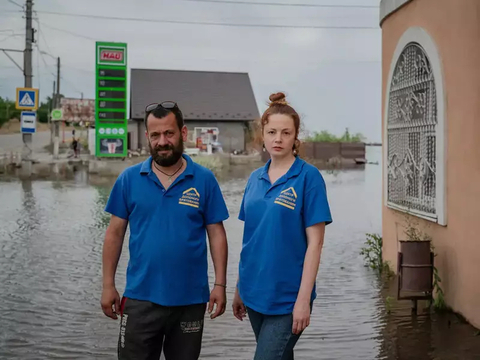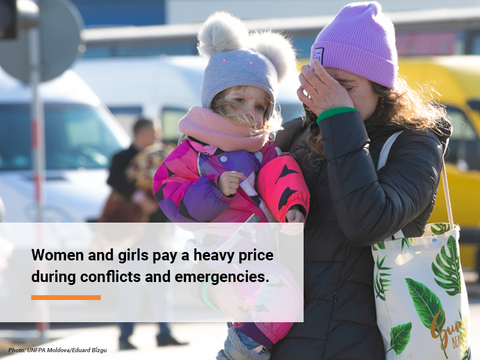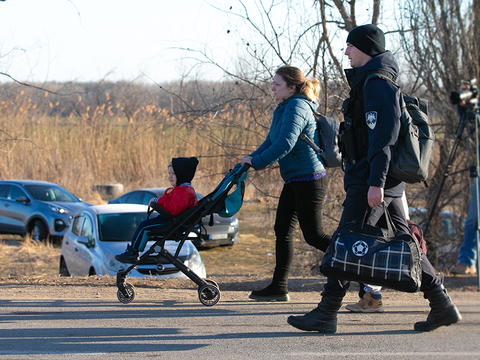You are here
- Home
- Riding the “Train of Hope” from Ukraine to Moldova
-
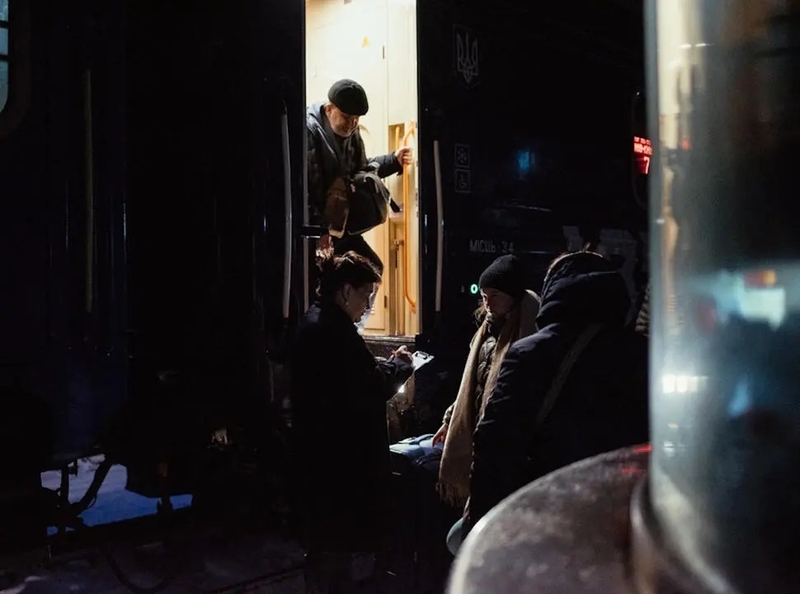
KYIV, Ukraine/CHIȘINĂU, Republic of Moldova – On 5 November, the capitals of Ukraine and the Republic of Moldova were connected by direct rail for the first time in 24 years. The new train line aims to offer refugees fleeing the war a safe route out of Ukraine and into the neighbouring Republic of Moldova – especially with a harsh winter looming and heating cuts already widespread.
Since the onset of war in Ukraine, more than 700,000 people have left the country for the Republic of Moldova, which is now also facing its own energy crisis. Some 100,000 refugees remain in the country, two thirds of them women, who face particular challenges when fleeing conflict.
“For them, displacement will bring increased vulnerability to violence, sexual abuse and exploitation,” said UNFPA Executive Director Dr. Natalia Kanem on International Women’s Day 2022.
But for many, the risk of staying behind in Ukraine and facing the threat of Russian attacks and a bitterly cold winter without heat or power outweighs any risks associated with making for Moldova – especially with the new train route providing passengers a secure pathway across borders.
The Kyiv-Chișinău train offers them hope that better, safer days are ahead. Follow along for one of its cross-border journeys between Ukraine and the Republic of Moldova, which transports passengers from the threat of peril towards the opportunity of peace.
[Pictured above] A conductor checks tickets before letting passengers board the train. © UNFPA/Mihail Kalarashan.
The train from Kyiv to Chișinău leaves at 5 p.m. On the platform, in the dim lamp light, passengers say goodbye and embrace those staying behind. Many leaving Kyiv will not be back soon, having made the difficult decision to leave the country before the onset of a bitter winter.
-
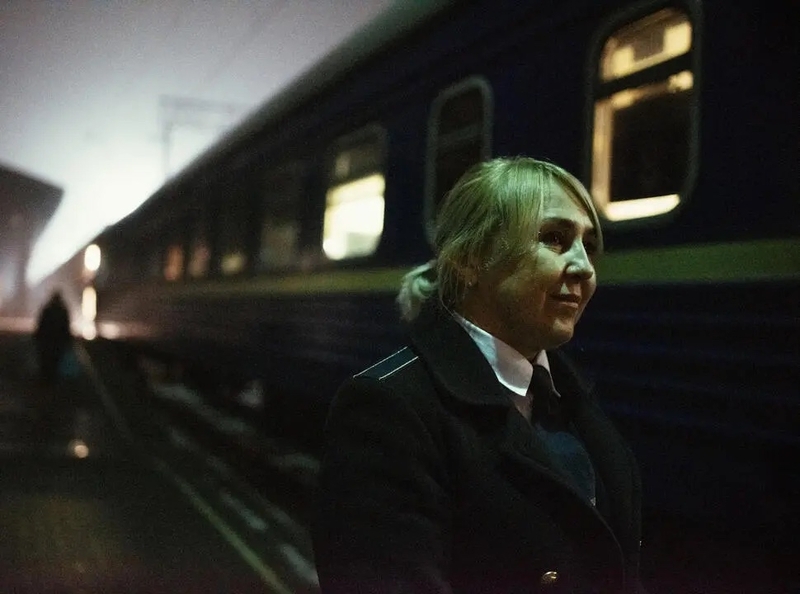
Larisa is a conductor and one of the veterans of Ukrainian Railway. © UNFPA UNFPA/Mihail Kalarashan.
The conductors check tickets, and soon after, the train starts moving. Those remaining on the platform, visible through duct-taped windows, wave the train goodbye. The windows are sealed in case Russian missiles explode nearby.
One of the conductors, Larisa, recalls working non-stop to help evacuate people as soon as full-scale war broke out.
“We spent weeks taking hundreds of people out of Kramatorsk and Kharkiv. Most of them simply slept in aisles between compartments, and left their luggage at the stations,” she said. “Women and children were a priority for us; they were the first to board a car that had at least some free space. We tried to support and care for them.”
Larisa’s last train trip to Kramatorsk was on 8 April. On that day, the Russian army fired a rocket at the railway station; the attack killed many civilians who were waiting to be evacuated.
-
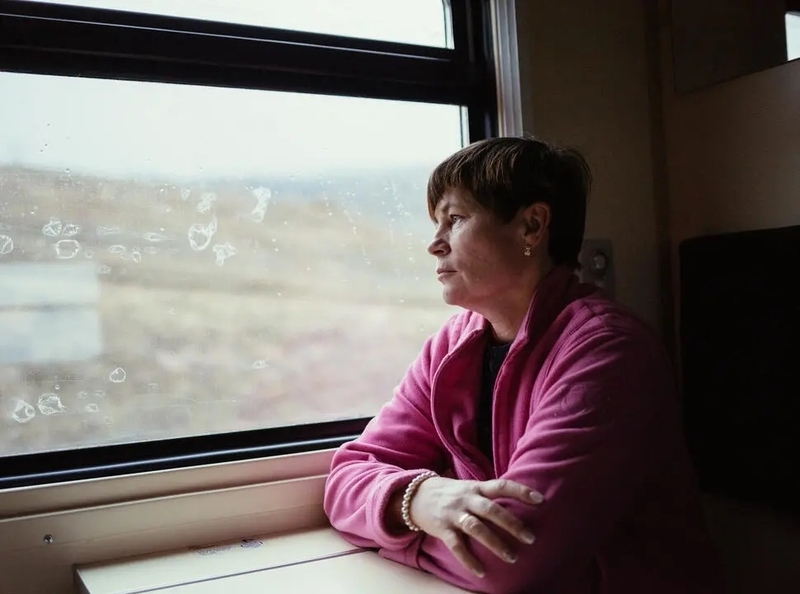
Tatiana is the mother of a soldier who lost an eye in the war. They are now on their way to the Republic of Moldova to fly to Türkiye, where her son will have an operation. © UNFPA/Mihail Kalarashan.
The train stops to allow new passengers to board. Tatiana enters Larisa’s train car with her 23-year-old son. The young man was wounded while serving on the front lines; he sits alone in one of the train’s compartments, his head wrapped in bandages.
“He already lost one eye, but there is a chance to save the second one,” Tatiana said. “We decided that we needed to get treatment in another country.”
Mother and son are travelling together through the Republic of Moldova to Türkiye, where he will seek another operation.
“The doctor said that God has big plans for my son – almost no one survives with his injuries. For me, the greatest happiness was to learn that he survived,” Tatiana said. In the intensive care unit where her son recovered, many others did not.
-
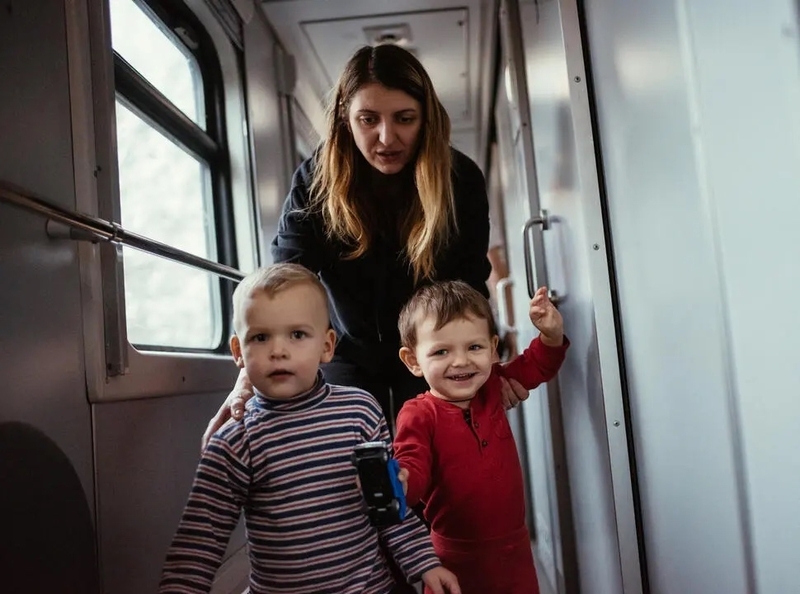
Violeta tries to calm the children on the train. In a couple of hours they will arrive in Chișinău, where a new stage of their lives will begin. © UNFPA/Mihail Kalarashan.
The train has seven carriages, each a separate world. In one, children laugh, play and watch cartoons while their mothers chat and prepare for the train’s arrival in Chișinău.
Marina and Violeta are friends. Each of them has two children: Older daughters and younger sons. This is their second time leaving Ukraine for Europe, as they have decided to spend the winter in Chișinău.
Marina’s family lost electricity after a rocket attack on Kyiv, and her son caught a cold when the house grew chilly. She hopes Chișinău will not only be safer, but warmer. “We knew that the winter would be hard. But after the latest attacks on infrastructure, everything changed,” Marina said.
“We have small children, and we cannot risk their health and lives.”
Violeta agrees the decision to leave was difficult. “We still do not know what to expect, how to deal with the children’s education, how to settle down. But the main thing now is that we are safe.”
-
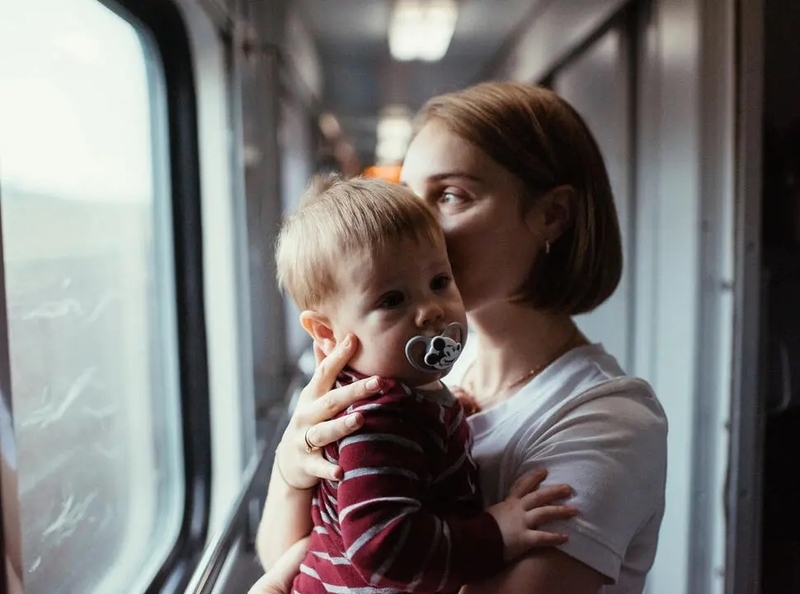
Yulia, a young mother from Kyiv, is also moving to Chișinău with her young son, Vlad. Vlad was born a week after the war began: He is a child of war. © UNFPA/Mihail Kalarashan.
In an adjacent compartment, a young mother named Yulia holds her baby boy, Vlad, who was born just a week after the start of the war.
“The military was assigned to our maternity hospital to protect us if the Russian army entered Kyiv,” she said. “It was scary in those days; we heard explosions.”
Yulia worries that her son’s short time on earth has been dominated by conflict. He is a little afraid of men, as since his birth, he’s spent most of his time with women. “He is a child of war, and we don’t know when it will all end,” she said.
-
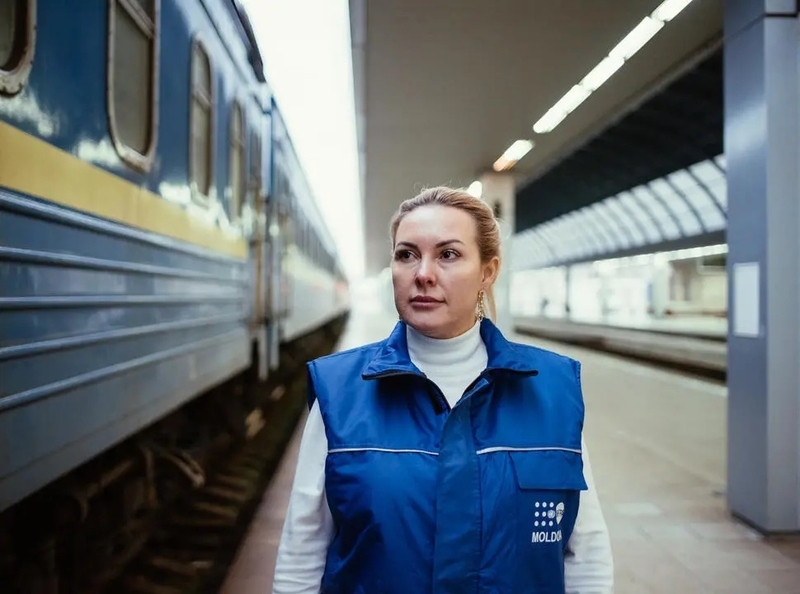
Pavlina, a UNFPA safe space manager at the Chișinău station. © UNFPA/Mihail Kalarashan.
After 18 hours of travel, the train arrives at the Chișinău railway station – its final destination. And it is warm.
Pavlina, the manager of UNFPA Moldova’s safe space at the station, greets arriving passengers. Safe spaces are facilities set up by UNFPA to address the humanitarian and psychosocial needs of refugees and others. Inside, newly arrived Ukrainians are offered compassionate care: First aid, dignity kits, essential information, cups of tea.
Safe spaces also provide reproductive health and crisis prevention services. For the hundreds of thousands of women fleeing Ukraine, the risk of gender-based violence remains high, as does the risk that their reproductive health needs will go unmet – with potentially life-threatening consequences.
-
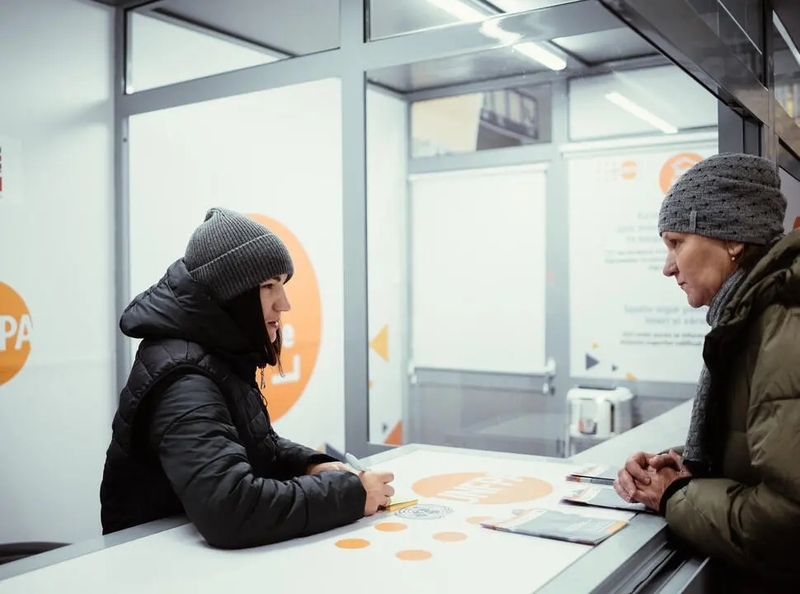
A safe space centre in the Chișinău railway station building. © UNFPA/Mihail Kalarashan.
Pavlina recalls a particular woman who passed through the Chișinău safe space on her way from Kyiv to her parents in Tbilisi, Georgia. “We began to talk, and she burst into tears. She said that her husband stayed in Kyiv, and she was pregnant,” Pavlina said.
The UNFPA team provided the young woman with some essentials and offered psychosocial support. She later wrote to Pavlina from Tbilisi, asking where UNFPA was located in the city.
“The next day, she said she was bleeding,” she said. “The girl lost her child.”
-
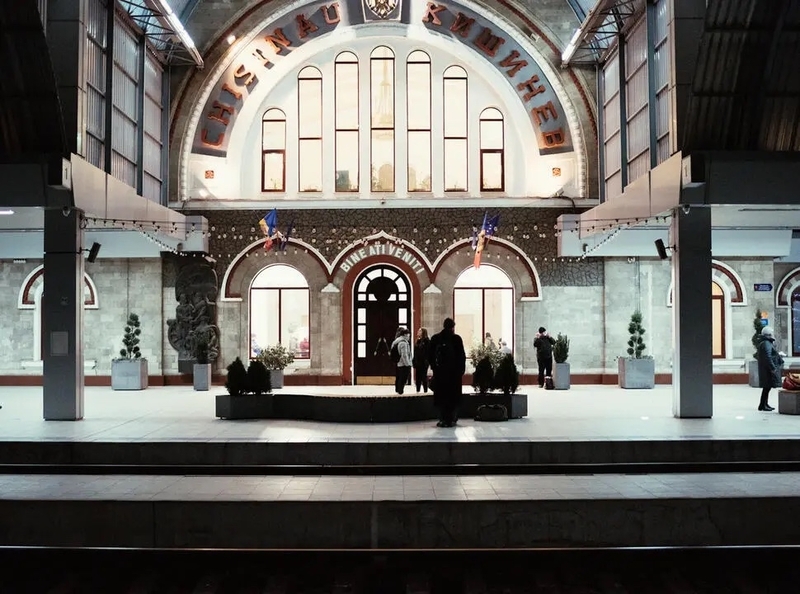
Chișinău railway station. © UNFPA/Mihail Kalarashan.
The train makes a reverse trip from Chișinău for Kyiv every day at 5:45 p.m. It used to run every two days, but the schedule changed for the holidays.
Although returning to Ukraine carries certain risks, many choose to make the trip back across the border to celebrate Christmas and the arrival of the new year in their home country among family and friends. The pull is strong. “East or West, home is best,” one passenger, 29-year-old Yulia, said.
With heavy bags in hand, people at the Chișinău railway station on their way to Kyiv head towards a blue train with yellow stripes – the colours of the Ukrainian flag. In 18 hours, the train will arrive at the Kyiv railway station, decorated with a Christmas tree whose lights are powered by pedalling a bicycle. Hugs and smiles await those reuniting with loved ones.
For the train of hope’s passengers, the rail link is a lifeline, providing both a route to safety and a way back home.
-
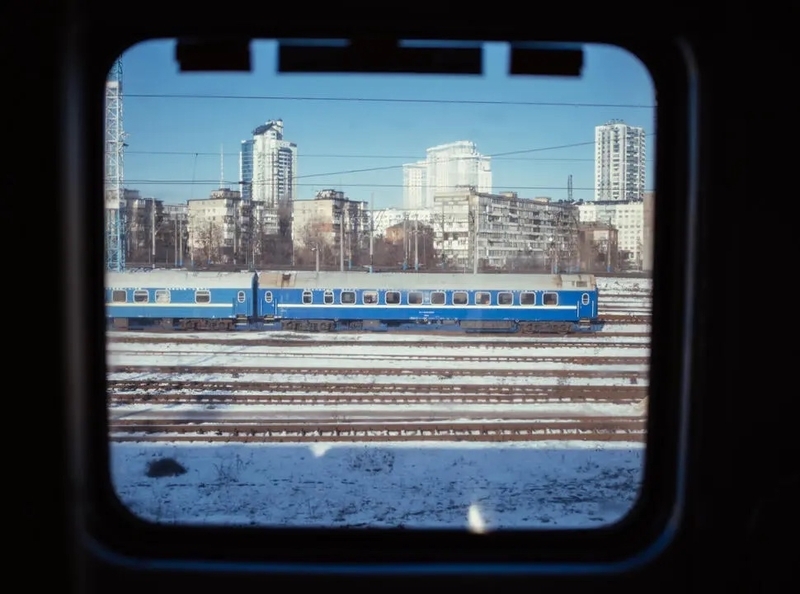
Kyiv landscape near the railway station. © UNFPA/Mihail Kalarashan.
UNFPA’s humanitarian response to the war stretches across Ukraine, the Republic of Moldova and several other countries hosting refugees. The agency is working with its partners to deliver essential services for women and young people, including by expanding safe spaces and online services to support survivors of gender-based violence and by providing reproductive health services and psychosocial support in hard-to-reach areas. As of December 2022, a total of 118 tons of life-saving reproductive health, medical and hygiene supplies had been distributed to health facilities in areas affected by the war.
In Moldova specifically, UNFPA is responding to the protection and health needs of refugees, including women and girls, through interventions such as Orange Safe Spaces, where refugees and host communities can get support related to gender-based violence and sexual and reproductive health. UNFPA also helps upgrade perinatal centers to ensure safe births, and works with the Government to ensure refugee women and girls have free access to sexual and reproductive health services and psychosocial support.
Related Slideshows
In the early hours of 6 June, the sound of explosions were heard before the Nova Kakhovka dam collapsed. The dam, on the Dnipro River, lies about 30km east of the city of Kherson. As torrents of water were unleashed, thousands of people were displaced in the region, parts of which were submerged underwater.
On this International Women’s Day, UNFPA calls upon the international community to ensure that women’s and girls’ health, rights and dignity are safeguarded, and critical infrastructure, protected, in every conflict and crisis-affected country.
When refugees arrive in the Republic of Moldova, UNFPA is on the ground at the border to provide immediate assistance and information to support refugee women and girls, including pregnant women and older persons.
